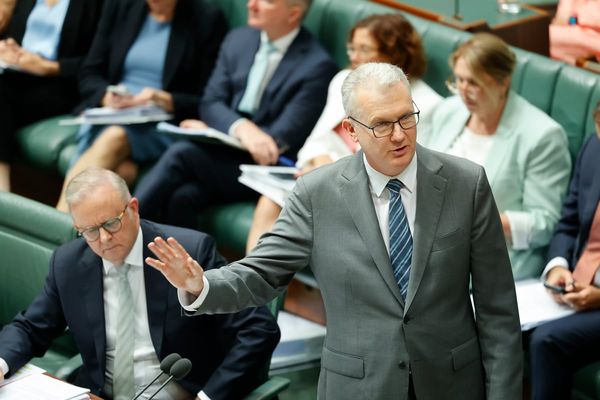
Depending on who you ask, a new AUKUS bill introduced to Parliament on Thursday will either cut red tape for researchers or have a chilling effect on innovation.
If critics’ worst fears are realised, the new Defence Trade Controls Amendment Bill will set Australian innovation back decades and force scientists to self-censor in order to avoid criminal fines.
But Defence Minister Richard Marles said the bill — aimed at making it easier to share military technology with the United States and the United Kingdom, while preventing the tech from falling into the wrong foreign hands — would cut “burdensome red tape”.
“This will benefit defence industry in Australia, unlocking over $5 billion — more than half of our annual exports — to our AUKUS partners,” he said in a statement circulated to reporters.
The bill would create an export licence-free environment for Australian, US and UK businesses and researchers to work within. It would also create three new criminal offences, punishable by up to 10 years in jail, for supplying certain technologies, goods and services to foreigners outside the trilateral AUKUS deal.
The Defence and Strategic Goods List, the contents of which would be covered by the new criminal offences, is 344 pages long.
Critics say the new rules would have a disturbing effect on research.
“Establishing a licence-free export environment with the US and UK will bring benefits to many researchers and companies,” the Australian Academy of Science and the Australian Academy of Technological Sciences and Engineering wrote in a joint submission to the bill earlier in November.
“However, the expansion of [the criminal offences] will create a level of uncertainty and doubt about how changes to Australia’s defence trade controls framework to align with the US environment will impact Australia’s research collaborations with countries outside of the trilateral AUKUS agreement.”
The submission added that researchers had raised concerns the new regime would force them to “self-censor” — “electing not to undertake certain collaborations or communication as it is too complex or onerous to assess if they may fall foul of the new measures and offences”.
In a statement made after the bill was introduced, the Science Academy’s president Chennupati Jagadish said Australia’s capacity to engage in the global research system was at stake.
“This legislation will see Australia expand its backyard to include the US and the United Kingdom but will raise the fence for many other countries when it comes to international research collaborations … the academy is concerned about the negative impacts this will have on research collaborations with all other countries, which serve our national interest,” he said.
Bill Greenwalt, a former US deputy undersecretary of defense for industrial policy and a prominent expert on US arms export laws and regulations, has been harshly critical of the bill.
“It looks like Australia just gave up its sovereignty and got nothing for it … I think they just put themselves back 50 years,” Greenwalt told the website Breaking Defence prior to the bill’s launch.
Interested parties had just 10 days to formally respond to a draft of the bill, which was quietly released by the Defence Department on November 7. Marles claimed in a press release that consultations had gone on since July. It’s understood the government had committed to introducing the bill before the end of the year and that legislators in the US and UK will make amendments to their own defence innovation regulations as well.
Marles’ office did not respond to calls, emails and text messages from Crikey over the past three days. Rather than responding to specific questions, the minister’s staff forwarded a copy of a press release on Thursday following Marles’ first reading speech to Parliament.
It’s not clear what, if any, of the suggestions from stakeholders were taken into consideration before the bill’s introduction to Parliament. Marles told Parliament it’s likely to go to a committee for scrutiny before passing.
Marles will visit Silicon Valley in the US on Friday, where he is scheduled to appear alongside his American and British counterparts to brief reporters on AUKUS developments.
Are you concerned about the latest AUKUS development? Readers, we want to hear from you — especially while our comments are closed due to our website upgrade. Send us your thoughts on this article to letters@crikey.com.au. Please include your full name to be considered for publication. We reserve the right to edit for length and clarity.







